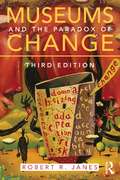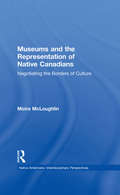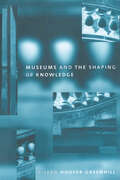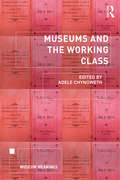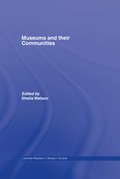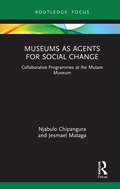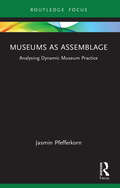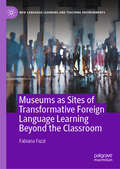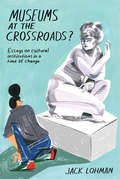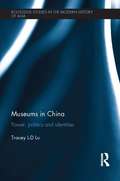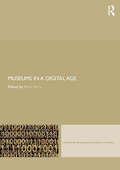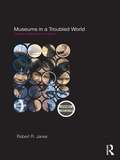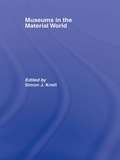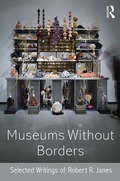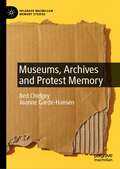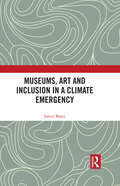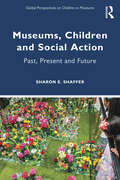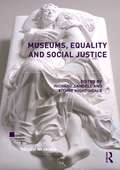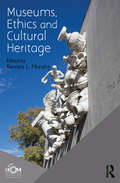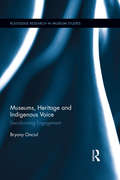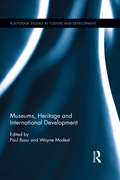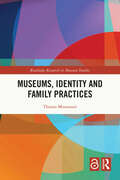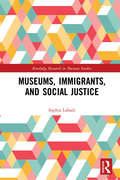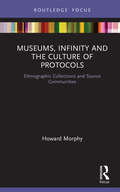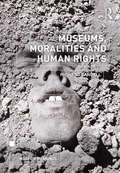- Table View
- List View
Museums and the Paradox of Change: A Case Study In Urgent Adaptation
by Robert R. JanesMuseums throughout the world are under increasing pressure in the wake of the 2008/2009 economic recession and the many pressing social and environmental issues that are assuming priority. The major focus of concern in the global museum community is the sustainability of museums in light of these pressures, not to mention falling attendance and the challenges of the digital world. Museums and the Paradox of Change provides a detailed account of how a major Canadian museum suffered a 40 percent loss in its operating budget and went on to become the most financially self-sufficient of the ten largest museums in Canada. This book is the most detailed case study of its kind and is indispensable for students and practitioners alike. It is also the most incisive published account of organizational change within a museum, in part because it is honest, open and reflexive. Janes is the first to bring perspectives drawn from complexity science into the discussion of organizational change in museums and he introduces the key concepts of complexity, uncertainty, nonlinearity, emergence, chaos and paradox. This revised and expanded third edition also includes new writing on strengthening museum management, as well as reflections on new opportunities and hazards for museums. It concludes with six ethical responsibilities for museum leaders and managers to consider. Janes provides pragmatic solutions grounded in a theoretical context, and highlights important issues in the management of museums that cannot be ignored.
Museums and the Representation of Native Canadians: Negotiating the Borders of Culture (Native Americans: Interdisciplinary Perspectives)
by Moira McLoughlinIf we were to think about museums as three dimensional maps-as spaces to be divided, defended, and privileged-what would they tell us about the place of Native Canadians within the larger nation? Utilizing a combination of exhibit analysis and interviews, this book explores how Canadian history, anthropology, and art museums have situated Native Canadian history and culture within a larger narrative of nationhood. Until very recently, these museums have, with few exceptions, perpetuated the continued isolation of Native Canadians on the Other side of carefully demarcated boundaries of time, space, and culture. Despite a living and highly politicized presence outside their walls, inside these museums Native Canadians have remained fixed and isolated in time and space. This book discusses how this particular image of Native Canadians has been translated into the numerous dichotomies and borders of the museum; between modern and traditional, past and present, myth and science, progress and stasis, active and passive, and, ultimately, us and them.However, in tribal museums and more recent programming at the larger museums we are able to identify alternative maps that realign these borders and give voice to alternative constructions of these histories. The past decade has seen enormous change in how museum curators, educators, and directors imagine their role in these museums and, more particularly, in the construction of a history of Native Canadians. This book considers how museums, and those who work within them, have responded to the challenge of writing a more complex and multivocal history for the nation.(Ph.D. dissertation, the Annenberg School for Communication, University of Pennsylvania, 1992; revised with new preface, bibliography, and index)
Museums and the Shaping of Knowledge
by Eileen Hooper GreenhillMuseums have been active in shaping knowledge over the last six hundred years. Yet what is their function within today's society? At the present time, when funding is becoming increasingly scarce, difficult questions are being asked about the justification of museums. Museums and the Shaping of Knowledge presents a critical survey of major changes in current assumptions about the nature of museums. Through the examination of case studies, Eilean Hooper-Greenhill reveals a variety of different roles for museums in the production and shaping of knowledge. Today, museums are once again organising their spaces and collections to present themselves as environments for experimental and self-directed learning.
Museums and the Working Class (Museum Meanings)
by Adele ChynowethMuseums and the Working Class is the first book to take an intersectional and international approach to the issues of economic diversity and class within the field of museum studies. Bringing together 16 contributors from eight countries, this book has emerged from the significant global dialogue concerning museums’ obligation to be inclusive, participate in meaningful engagement and advocate for social change. As part of the push for museums to be more accessible and inclusive, museums have been challenged to critically examine their power relationships and how these are played out in what they collect, whose stories they exhibit and who is made to feel welcome in their halls. This volume will further this professional and academic debate through the discussion of class. Contributions to the book will also reinforce the importance of the working class – not only in collection and exhibition policy, but also for the organisational psychology of institutions. Museums and the Working Class is essential reading for scholars and students of museum, gallery and heritage studies, cultural studies, sociology, labour studies and history. It will also serve as a source of honest and research-led inspiration to practitioners working in museums, galleries, libraries, archives and at heritage sites around the world.
Museums and their Communities (Leicester Readers in Museum Studies)
by Sheila WatsonUsing case studies drawn from all areas of museum studies, Museums and their Communities explores the museums as a site of representation, identity and memory, and considers how it can influence its community. Focusing on the museum as an institution, and its social and cultural setting, Sheila Watson examines how museums use their roles as informers and educators to empower, or to ignore, communities. Looking at the current debates about the role of the museum, she considers contested values in museum functions and examines provision, power, ownership, responsibility, and institutional issues. This book is of great relevance for all disciplines as it explores and questions the role of the museum in modern society.
Museums as Agents for Social Change: Collaborative Programmes at the Mutare Museum (Museums in Focus)
by Njabulo Chipangura Jesmael MatagaMuseums as Agents for Social Change is the first comprehensive text to examine museum practice in a decolonised moment, moving beyond known roles of object collection and presentation. Drawing on studies of Mutare museum, a regional museum in Eastern Zimbabwe, this book considers how museums with inherited colonial legacies are dealing with their new environments. The book provides an examination of Mutare museum’s activism in engaging with topical issues affecting its surrounding community and Chipangura and Mataga demonstrate how new forms of engagement are being deployed to attract new audiences, whilst dealing with issues such as economic livelihoods, poverty, displacement, climate change and education. Illustrating how recent programmes have helped to reposition Mutare museum as a decolonial agent of social change and an important community anchor institution, the book also demonstrates how other museums can move beyond the colonial preoccupation with the gathering of collections, conservation and presentation of cultural heritage to the public. Museums as Agents for Social Change will primarily be of interest to academics and students working in the fields of museum and heritage studies, history, archaeology and anthropology. It should also be appealing to museum professionals around the world who are interested in learning more about how to decolonise their museum.
Museums as Assemblage: Analysing dynamic museum practice (Museums in Focus)
by Jasmin PfefferkornMuseums as Assemblage offers a new way of thinking about the dynamism of art museums. Using the concept of assemblage, this book unpacks relations between visitors, artists, museum staff, and the museum’s nonhuman components, providing an analytical framework that celebrates the complexity of museums today. It takes the Museum of Old and New Art (Mona) in Tasmania as its primary case study but situates it in global trends by drawing on a range of examples from art museums across Australia, New Zealand, Europe, and East Asia. It provides insight into how perceptions around engagement are enabled and constrained in the context of different museums and highlights the necessity of an analytical framework that accommodates the complexity and multiplicity of the contemporary museum landscape. With an emphasis on visitor experience and curatorial strategy, the book is valuable for students and researchers in museum studies, art history, curatorial studies, and cultural studies.
Museums as Sites of Transformative Foreign Language Learning Beyond the Classroom (New Language Learning and Teaching Environments)
by Fabiana FazziThis book takes a look at the affordances of engaging second/foreign language students in educational projects that bridge the gap between the classroom and the museum. Studies on language learning and teaching beyond the classroom have shown that students learn in different settings and through different types of activities and that their learning is influenced by the intersection of different dimensions. Drawing on both language and museum learning and teaching research, this book discusses the aspects that make the museum an ideal language learning setting and then outlines evidence-based pedagogical guidelines to design effective learning experiences for language learners across the classroom and the museum. It will be of interest to graduate students, language teachers, teacher trainers, museum educators, and researchers in fields including Educational Linguistics, Anthropological Linguistics, and Museum Studies (Education).
Museums at the Crossroads?: Essays on Cultural Institutions in a Time of Change
by Jack LohmanIn this collection of illuminating essays, Jack Lohman, chief executive officer of the Royal British Columbia Museum, shares his views on the role of museums in the various cultures of the world, on the importance of architecture and design in the personality of a museum, on the challenges of creating resilient cultural institutions in the face of financial crises, and much more. He speaks from the heart and from his many years of experience in some of the great museums, in London, Rio de Janeiro, Cape Town, Warsaw and many other cities around the world.
Museums in China: Power, Politics and Identities (Routledge Studies in the Modern History of Asia)
by Tracey Lie LuFrom the earliest museums established by Western missionaries in order to implement religious and political power, to the role they have played in the formation of the modern Chinese state, the origin and development of museums in mainland China differ significantly from those in the West. The occurrence of museums in mainland China in the late nineteenth century was primarily a result of internal and external conflicts, Westernization and colonialism, and as such they were never established solely for enjoyment and leisure. Using a historical and anthropological framework, this book provides a holistic and critical review on the establishment and development of museums in mainland China from 1840 to the present day, and shows how museums in China have been used by a wide range of social, political, and state actors for a number of economic, religious, political and ideological purposes. Indeed, Tracey L-D Lu examines the key role played by museums in reinforcing social segmentation, influencing the economy, protecting cultural heritage and the construction and enhancement of ethnic identities and nationalism, and how they have throughout their history helped the powerful to govern the less powerful or the powerless. More broadly, this book provides important comparative insights on museology and heritage management, and questions who the key stakeholders are, how museums reflect broader social and cultural changes, and the relationship between museum and heritage management. Drawing on extensive archival research and anthropological fieldwork, as well as the author’s experience working as a museum curator in mainland China in the late 1980s, Museums in China such will be of great interest to students and scholars working across museology, heritage studies, tourism studies Chinese culture and Chinese history.
Museums in a Digital Age: Museums In A Digital Age (Leicester Readers in Museum Studies)
by Ross ParryThe influence of digital media on the cultural heritage sector has been pervasive and profound. Today museums are reliant on new technology to manage their collections. They collect digital as well as material things. New media is embedded within their exhibition spaces. And their activity online is as important as their physical presence on site. However, ‘digital heritage’ (as an area of practice and as a subject of study) does not exist in one single place. Its evidence base is complex, diverse and distributed, and its content is available through multiple channels, on varied media, in myriad locations, and different genres of writing. It is this diaspora of material and practice that this Reader is intended to address. With over forty chapters (by some fifty authors and co-authors), from around the world, spanning over twenty years of museum practice and research, this volume acts as an aggregator drawing selectively from a notoriously distributed network of content. Divided into seven parts (on information, space, access, interpretation, objects, production and futures), the book presents a series of cross-sections through the body of digital heritage literature, each revealing how a different aspect of curatorship and museum provision has been informed, shaped or challenged by computing. Museums in a Digital Age is a provocative and inspiring guide for any student or practitioner of digital heritage.
Museums in a Troubled World: Renewal, Irrelevance or Collapse? (Museum Meanings)
by Robert R. JanesAre Museums Irrelevant? Museums are rarely acknowledged in the global discussion of climate change, environmental degradation, the inevitability of depleted fossil fuels, and the myriad local issues concerning the well-being of particular communities – suggesting the irrelevance of museums as social institutions. At the same time, there is a growing preoccupation among museums with the marketplace, and museums, unwittingly or not, are embracing the values of relentless consumption that underlie the planetary difficulties of today. Museums in a Troubled World argues that much more can be expected of museums as publicly supported and knowledge-based institutions. The weight of tradition and a lack of imagination are significant factors in museum inertia and these obstacles are also addressed. Taking an interdisciplinary approach, combining anthropology ethnography, museum studies and management theory, this book goes beyond conventional museum thinking. Robert R. Janes explores the meaning and role of museums as key intellectual and civic resources in a time of profound social and environmental change. This volume is a constructive examination of what is wrong with contemporary museums, written from an insider’s perspective that is grounded in both hope and pragmatism. The book’s conclusions are optimistic and constructive, and highlight the unique contributions that museums can make as social institutions, embedded in their communities, and owned by no one.
Museums in the Material World (Leicester Readers in Museum Studies)
by Simon KnellMuseums in the Material World seeks to both introduce classic and thought-provoking pieces and contrast them with articles which reveal grounded practice. The articles are selected from across the full breadth of museum disciplines and are linked by a logical narrative, as detailed in the section introductions. The choice of articles reveals how the debate has opened up on disciplinary practice, how the practices of the past have been critiqued and in some cases replaced, how it has become necessary to look beyond and outside disciplinary boundaries, and how old practices can in many circumstances continue to have validity. Museums in the Material World is about broadening horizons and moving museum studies students, and others, beyond the narrow confines of their own disciplinary thinking or indeed any narrow conception of collections. In essence, this is a book about the practice of interpretation and will therefore be of great use to those students and museum practitioners involved in the field of material culture in museums.
Museums without Borders: Selected Writings of Robert R. Janes
by Robert R. JanesDrawing together nearly 40 years of experience, Museums without Borders presents the key works of one of the most respected practitioners and scholars in the field. Through these selected writings, Robert R. Janes demonstrates that museums have a broader role to play in society than is conventionally assumed. He approaches the fundamental questions of why museums exist and what they mean in terms of identity, community, and the future of civil life. This book consists of four Parts: Indigenous Peoples; Managing Change; Social Responsibility, and Activism and Ethics. The Parts are ordered chronologically and each begins with an introduction and an overview of the ensuing articles which situates the papers in their historical and cultural contexts. Using an interdisciplinary approach that combines anthropology, ethnography, museum studies and management theory, Janes both questions and supports mainstream museum practice in a constructive and self-reflective manner, offering readers alternative viewpoints on important issues. Considering concepts not generally recognized in museum practice, such as the Roman leadership model of primus inter pares and the Buddhist concept of mindfulness, Janes argues that the global museum community must examine how they can meet the needs of the planet and its inhabitants. Museums without Borders charts the evolving role of the contemporary museum in the face of environmental, societal and ethical challenges, and explores issues that have, and will, continue to shape the museum sector for decades to come. This book demonstrates that it is both reasonable and essential to expand the purpose of museums at this point in history – not only because of their unique characteristics and value to society, but also because of Janes’ respect and admiration for their rich legacy. It is time that museums assist in the creation of a new, caring, and more conscious future for themselves and their communities. This can only be done through authentic engagement with contemporary issues and aspirations.
Museums, Archives and Protest Memory (Palgrave Macmillan Memory Studies)
by Joanne Garde-Hansen Red ChidgeyThis book addresses the emergence of ‘protest memory’ as a powerful contemporary shaper of ideas and practices in culture, media and heritage domains. Directly focused on the role of museum and archive practitioners in protest memory curation, it makes a compelling contribution to our understanding of how social movements and activist experiences are publicly remembered and activated for social and environmental justice.
Museums, Art and Inclusion in a Climate Emergency
by Janice BakerMuseums, Art and Inclusion in a Climate Emergency considers the impact of the Anthropocene on history and memory, approaches to objects and agency and the incommensurability of western and Indigenous ontologies. Drawing on Indigenous knowledge, humanities and museological literature, continental philosophy, contemporary art and popular culture, Baker acknowledges the autonomous agency of geological forms, including soils, minerals and fossil fuels. Demonstrating that this has implications for an expanded idea of an ‘inclusive’ museum and its relationship to entities beyond ‘life’ and living species, the book argues that the ‘inclusion’ paradigm needs to include nonlife actors. Gesturing to a geontological ‘turn’ through developing notions of geo-inclusion, the mineralhuman and approaches to object agency that connect with Aboriginal ‘heritage’, Baker exposes the ongoing destruction of Country by mining interests in Western Australia and elsewhere. By addressing the need for urgent change through the artifice of the museum, the book identifies an expanded approach to inclusion beyond the limits imposed by the politics of identity. Museums, Art and Inclusion in a Climate Emergency theorises the potential of an expanded idea of the museum and will be of interest to scholars and students engaged in the study of museums and heritage, environmental humanities and geo-humanities, ecological art history and contemporary art.
Museums, Children and Social Action: Past, Present and Future (Global Perspectives on Children in Museums)
by Sharon E. ShafferMuseums, Children and Social Action examines the role that museums play in reaching, teaching and inspiring children as global citizens of the world and, looking to the future, argues that the sustainability of museums will come from strengthening relationships with young visitors. Presenting a diverse range of programs, exhibitions and outreach from museums across five continents, Shaffer highlights how museums are already serving children and making a difference in their lives. Arguing that museums have a unique responsibility to connect this audience with relevant social issues and challenges, such as social injustice, racism, climate change and poverty, Shaffer simultaneously acknowledges that a large number of children are still on the margins of the institution and its mission. Recognizing the ways in which museums are currently serving children, the book also considers what museums could and should be doing as they plan for the future, raising critical questions about core values, community partners and social agendas. Museums, Children and Social Action is essential reading for academics and students engaged in the study of museums, social justice and childhood. It encourages museums to make it their mission to educate and serve this audience and their families for the good of children, as well as museums, while also considering what their institutions can do to make a lasting impact on children and their families.
Museums, Equality and Social Justice (Museum Meanings)
by Richard Sandell Eithne NightingaleThe last two decades have seen concerns for equality, diversity, social justice and human rights move from the margins of museum thinking and practice, to the core. The arguments – both moral and pragmatic – for engaging diverse audiences, creating the conditions for more equitable access to museum resources, and opening up opportunities for participation, now enjoy considerable consensus in many parts of the world. A growing number of institutions are concerned to construct new narratives that represent a plurality of lived experiences, histories and identities which aim to nurture support for more progressive, ethically-informed ways of seeing and to actively inform contemporary public debates on often contested rights-related issues. At the same time it would be misleading to suggest an even and uncontested transition from the museum as an organisation that has been widely understood to marginalise, exclude and oppress to one which is wholly inclusive. Moreover, there are signs that momentum towards making museums more inclusive and equitable is slowing down or, in some contexts, reversing. Museums, Equality and Social Justice aims to reflect on and, crucially, to inform debates in museum research, policy and practice at this critical time. It brings together new research from academics and practitioners and insights from artists, activists, and commentators to explore the ways in which museums, galleries and heritage organisations are engaging with the fast-changing equalities terrain and the shifting politics of identity at global, national and local levels and to investigate their potential to contribute to more equitable, fair and just societies.
Museums, Ethics and Cultural Heritage
by IcomThis volume provides an unparalleled exploration of ethics and museum practice, considering the controversies and debates which surround key issues such as provenance, ownership, cultural identity, environmental sustainability and social engagement. Using a variety of case studies which reflect the internal realities and daily activities of museums as they address these issues, from exhibition content and museum research to education, accountability and new technologies, Museums, Ethics and Cultural Heritage enables a greater understanding of the role of museums as complex and multifaceted institutions of cultural production, identity-formation and heritage preservation. Benefitting from ICOM’s unique position in the museum world, this collection brings a global range of academics and professionals together to examine museums ethics from multiple perspectives. Providing a more complete picture of the diverse activities now carried out by museums, Museums, Ethics and Cultural Heritage will appeal to practitioners, academics and students alike.
Museums, Heritage and Indigenous Voice: Decolonizing Engagement (Routledge Research in Museum Studies #10)
by Bryony OnciulCurrent discourse on Indigenous engagement in museum studies is often dominated by curatorial and academic perspectives, in which community voice, viewpoints, and reflections on their collaborations can be under-represented. This book provides a unique look at Indigenous perspectives on museum community engagement and the process of self-representation, specifically how the First Nations Elders of the Blackfoot Confederacy have worked with museums and heritage sites in Alberta, Canada, to represent their own culture and history. Situated in a post-colonial context, the case-study sites are places of contention, a politicized environment that highlights commonly hidden issues and naturalized inequalities built into current approaches to community engagement. Data from participant observation, archives, and in-depth interviewing with participants brings Blackfoot community voice into the text and provides an alternative understanding of self and cross-cultural representation. Focusing on the experiences of museum professionals and Blackfoot Elders who have worked with a number of museums and heritage sites, Indigenous Voices in Cultural Institutions unpicks the power and politics of engagement on a micro level and how it can be applied more broadly, by exposing the limits and challenges of cross-cultural engagement and community self-representation. The result is a volume that provides readers with an in-depth understanding of the nuances of self-representation and decolonization.
Museums, Heritage and International Development (Routledge Studies in Culture and Development #1)
by Wayne Modest Paul BasuWhile many claims are made regarding the power of cultural heritage as a driver and enabler of sustainable development, the relationship between museums, heritage and development has received little academic scrutiny. This book stages a critical conversation between the interdisciplinary fields of museum studies, heritage studies and development studies to explore this under-researched sphere of development intervention. In an agenda-setting introduction, the editors explore the seemingly oppositional temporalities and values represented by these "past-making" and "future-making" projects, arguing that these provide a framework for mutual critique. Contributors to the volume bring insights from a wide range of academic and practitioner perspectives on a series of international case studies, which each raise challenging questions that reach beyond merely cultural concerns and fully engage with both the legacies of colonial power inequalities and the shifting geopolitical dynamics of contemporary international relations. Cultural heritage embodies different values and can be instrumentalized to serve different economic, social and political objectives within development contexts, but the past is also intrinsic to the present and is foundational to people’s aspirations for the future. Museums, Heritage and International Development explores the problematics as well as potentials, the politics as well as possibilities, in this fascinating nexus.
Museums, Identity and Family Practices (Routledge Research in Museum Studies)
by Theano MoussouriMuseums, Identity and Family Practices locates museum participation and meaning making in the realm of everyday family practices, which are central to understanding the role museums play in family social life.Drawing on a substantial amount of data from a wide range of sources, Moussouri discusses the importance of understanding how family practices are enacted across settings and how the arena of the museum can facilitate certain family practices and impede others. Developing and theorising key concepts, the book elucidates the key research themes, including everyday family practice; meaning making; and the structural characteristics of museums as arenas for the family visit activity. The analysis is rooted in a dialectical theoretical framework specifically developed to bridge the macrolevel (social order or the arena of the museum) and microlevel (family practices).Museums, Identity and Family Practices offers a novel and holistic approach to studying contemporary families and, as such, is key reading for scholars and students of museum and heritage studies, family studies, visitor studies, cultural studies, education, sociology and anthropology. Museum and heritage professionals working with families in different communities around the world will also find this book relevant to their practice.The Open Access version of this book, available at http://www.taylorfrancis.com, has been made available under a Creative Commons Attribution-Non Commercial-No Derivatives (CC-BY-NC-ND) 4.0 license.
Museums, Immigrants, and Social Justice (Routledge Research in Museum Studies)
by Sophia LabadiThis interdisciplinary book argues that museums can offer a powerful, and often overlooked, arena for both exploring and acting upon the interrelated issues of immigration and social justice. Based on three in-depth European case studies, spanning France, Denmark, and the UK, the research examines programs developed by leading museums to address cultural, economic, social and political inequalities. Where previous studies on museums and immigration have focused primarily on issues of cultural inequalities in collection and interpretation, Museums, Immigrants, and Social Justice adopts a more comprehensive focus that extends beyond the exhibition hall to examine the full range of programs developed by museums to address the of cultural, economic, social and political inequalities facing immigrants.Museums, Immigrants, and Social Justice offers compelling insights on the ability of museums to offer positive contributions to the issues surrounding immigration and social justice at a time when both are pressing issues in Europe. It will be of interest to scholars and students of museum studies, migration studies, sociology, human geography and politics.
Museums, Infinity and the Culture of Protocols: Ethnographic Collections and Source Communities (Museums in Focus)
by Howard MorphyMuseums, Infinity and the Culture of Protocols enters a dialogue about museums’ responsibility for the curation of their collections into an infinite future while also tackling contentious issues of repatriation and digital access to collections. Bringing into focus a number of key debates centred on ethnographic collections and their relationship with source communities, Morphy considers the value material objects have to different ‘local’ communities – the museum and the source community – and the value-creation processes with which they are entangled. The focus on values and value brings the issue of repatriation and access into a dialogue between the two locals, questioning who has access to collections and whose values are taken into consideration. Placing the museum itself firmly at the centre of the debate, Morphy posits that museums constitute a kind of ‘local’ embedded in a trajectory of value. Museums, Infinity and the Culture of Protocols challenges aspects of postcolonial theory that position museums in the past by presenting an argument that places relationships with communities as central to the future of museums. This makes the book essential reading for academics and students working in the fields of museum and heritage studies, anthropology, archaeology, Indigenous studies, cultural studies, and history.
Museums, Moralities and Human Rights (Museum Meanings)
by Richard SandellThis book explores how museums, galleries and heritage sites of all kinds, through the narratives they construct and publicly present, can shape the moral and political climate within which human rights are experienced. Through a series of richly-drawn cases, which focus on gender diversity and same-sex love and desire, Richard Sandell examines the ways in which museums are implicated in the ongoing struggle for lesbian, gay, bisexual, transgender and intersex human rights. Museums, Moralities and Human Rights brings together for the first time the perspectives not only of those who work in, govern, fund and visit museums but also those of rights activists and campaigners who, at key moments in their struggle, have turned their attention to museums to advance their cause. Offering new insights into how human rights are continually fought for, realised and refused, this volume makes the case for museums of all kinds to take up an active, mindful and purposive engagement with contemporary human rights concerns.
